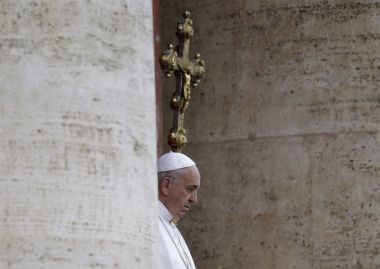Pope Francis pays tribute to victims of Armenian genocide

The Pope has paid tribute to the victims of the Armenian genocide, the Ottoman government's extermination of its Armenian minority in a series of massacres that began 100 years ago this month.
Pope Francis, who received in audience 20 Armenian Catholic bishops, prior to a Sunday Mass at St Peter's in Rome, noted the tragedy that the descendants of those who did manage to escape to places such as Aleppo were themselves now in danger of persecution and death.
At the Mass, during which the 10th century Armenian poet St Gregory of Narek will be proclaimed a Doctor of the Church, Pope Francis said they will "raise a prayer of Christian intercession for the sons and daughters of your beloved people, who were made victims a hundred years ago."
He also pleaded for divine mercy "so that it might help all, in the love for truth and justice, to heal every wound and to expedite concrete gestures of reconciliation and peace between the nations that still have not managed to reach a reasonable consensus on the interpretation of these sad events."
Many clergy and lay people of the Armenian Catholic Church are in Rome with their bishops.
Pope Francis remembered all in the Armenian diaspora. He said: "I think with particular sadness of those areas, such as that of Aleppo, that a hundred years ago were a safe haven for the few survivors. In such regions the stability of Christians, not only Armenians, has latterly been placed in danger".
Armenians are recognised as the first to convert to Christianity in 301. Pope Francis said they had a 2000-year history that preserves "an admirable patrimony of spirituality and culture, united with a capacity for recovery amid the many persecutions and trials to which it has been subjected."
He prayed for wisdom, noting that the commemoration of the victims of a hundred years ago forces confrontation with the "darkness of the mysterium iniquitatis", or the mystery of evil.
"As the Gospel tells us, from the depths of the human heart there may emerge the darkest powers, capable of planning the systematic annihilation of one's brother, of considering him an enemy, an adversary, or even without the same human dignity," he said. "But for believers the issue of the evil committed by man also introduces the mystery of participation in the redemptive Passion: a number of sons and daughters of the Armenian nation were capable of pronouncing Christ's name to the point of shedding their blood or of death by starvation during the interminable exodus they were forced to undertake".
"The painful pages in the history of your people continue, in a certain sense, the Passion of Christ, but in each one of these there is also the germ of the Resurrection. There is no lack of commitment among you, Pastors, to the education of the lay faithful to enable them to interpret reality with new eyes, in order to be able to say every day: my people consists not only of those who suffer for Christ, but above all of those who are risen in Him.
"Therefore it is important to remember the past, in order to draw from it the new lymph needed to nurture the present with the glorious announcement of the Gospel and with the witness of charity. I encourage you to support the path of continuing formation of priests and consecrated persons. They are your first collaborators. The communion between them and you will be strengthened by the exemplary fraternity they may observe in the Synod and with the Patriarch."
He made special reference to Pope Benedict XV who intervened before the Sultan Mehmet V to bring an end to the massacre of the Armenians. He also referred to talks between the Catholic Armenian Church and the Armenian Apostolic Church, noting that "ecumenism of blood" had already been achieved through the martyrdom and persecution that took place one hundred years ago.











